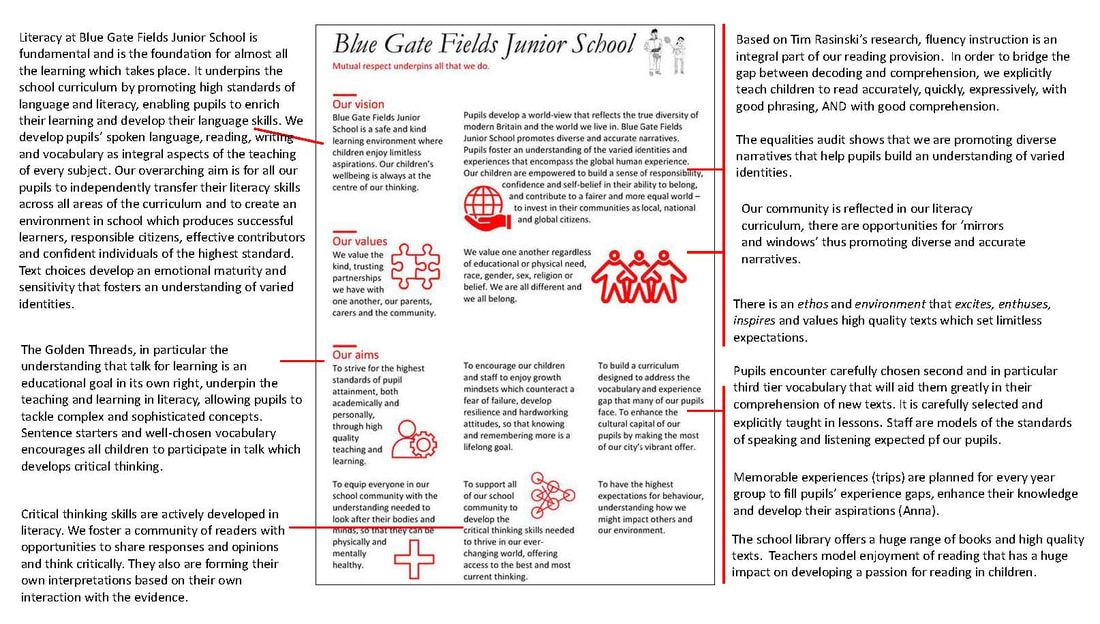English and Literacy
Literacy at Blue Gate Fields Junior School is fundamental and is the foundation for almost all the learning which takes place. It underpins the school curriculum by promoting high standards of language and literacy, enabling pupils to enrich their learning and develop their language skills. The ability to read and write well are vital skills for all pupils, paving the way for an enjoyable and successful school experience. We develop pupils’ spoken language, reading, writing and vocabulary as integral aspects of the teaching of every subject. English is both a subject in its own right and the medium for teaching. Our overarching and long-term aim is for all our pupils to independently transfer their literacy skills across all areas of the curriculum and to create an environment in school which produces successful learners, responsible citizens, effective contributors and confident individuals of the highest standard.
All learning is underpinned by links to quality literature; speaking and listening and reading and writing feature heavily in all our learning. Carefully selected texts inspire our pupils to delve into imaginary worlds empathise and engage with unfamiliar experiences and contexts, through the carefully selected texts used in lesson and reading for pleasure. Consequently, we provide many purposeful writing opportunities which allow coverage of both fiction and non-fiction genres, meticulously mapped out on our literacy curriculum map ensuring progression through the school. Writing is included across our curriculum in a meaningful and purposeful way by thinking about the purpose for writing and our audiences. Each year group has a number of core books that form the basis of their English curriculum. From these, the teacher plans for grammar application opportunities and good quality writing opportunities across a range of genres, by providing models of the structure, features and language of a given text.
We aim to provide a learning environment that encourages all children to fully develop their ability to read. The specific teaching of reading takes place during daily literacy lessons supported and enhanced by resources which use high quality literature, planning and teaching approaches recommended by The Centre for Literacy in Primary Education (CLPE) and the Literacy and Language (Read, Write inc) programmes which include phonics. Pupils are taught to use various reading strategies, exploring and deepening understanding of the reading domains. Comprehension is also a key aspect of guided reading whereby pupils develop a secure understanding of the content they have read through excellent questioning. Children also have guided reading intervention where more targeted teaching supports each child’s individual needs.
The school has a thriving library of 20,000 books which houses a wide range of high quality fiction, non-fiction and poetry for pupils to borrow and read. Poetry is also included through the deepening activities and we feel that it is an essential part of language learning and playfulness brought to the fore during our school’s celebratory poetry week. An inviting, stimulating classroom library can be found in every class epitomising what our school offers to encourage reading. These classroom libraries reflect learning in other subject areas by providing opportunities for wider related reading. We regularly invite authors to visit our school to share with pupils the literature they publish, as well as their experience of writing and illustration.
The hearts and minds of our children are captured so that they not only make great progress, but also develop a love for reading and writing and all things English!
CLPE, Tower Hamlets and Read Write Inc Literacy and Language unit plans are adapted to plan sequences of teaching and learning for reading and writing. These sequences use Tower Hamlets Toolkits to inform planning in terms of reading and comprehension; in writing the Toolkits address spoken language, vocabulary, grammar, punctuation, composition, transcription and handwriting. Literature choices are determined by the LITCOs in conjunction with the Year Groups teams and the Librarian. These choices are reviewed regularly to ensure that they remain relevant and inspiring for the pupils and teachers. Where possible, all pupils study the same, or related texts, with planning used to differentiate outcomes according to ability and needs. Related whole class novels are selected from a recommended reading list and sourced from the library. Teachers plan for, and resource, classroom libraries to reflect current themes and learning. The libraries are resourced by our school library and the Support for Learning Services library.
Teachers plan sequences of lessons towards a written outcome using a Learning Journey approach. This method of ‘backward planning’ takes a desired outcome and then unpicks the learning needed as a journey that matches learning intentions to a finished piece of writing. This planning is resourced using Alan Peat sentence structures, Descripotaurus, Mrs Wordsmith vocabulary collections, Nicolas Roberts approaches to planning for writing, Pie Corbett Talk for Writing (non-fiction resource), Sue Palmer skeletons and the CLPE teaching and learning strategies (role on the wall, conscience alley etc.)
Spelling is planned using Read Write Inc phonics programmes in Year 3 and 4 as an intervention, a more advanced RWI spelling programme is used in 3, 4 and Year 5. In Year 6, the National Literacy Spelling Bank is used.
Handwriting is planned using the Jarman Handwriting Scheme of Work which ensures a consistent, progressive approach to letter formation, joining and style.

